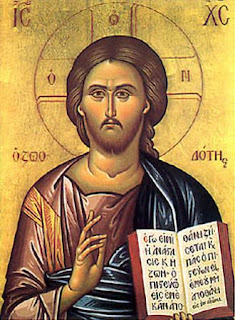Sunday, August 14, 2011
Because God Became Human To Save Us All
The title of this post says it all. Why bother becoming a Christian unless you believe this? "God became human to save us all." And if you do believe it, why not practice the ancient faith of the earliest Christians? The one that, despite criticisms attempting to prove the opposite, has developed since Christ ascended to heaven, and yet has not done so at the expense of Biblical truth.
This post is not an attempt to explain all of that. That is what this blog, and a lifetime of study, prayer, and reflection, is for. Today though, just for a few minutes, pause from all the crises and craziness of your daily life to ponder the fact that God became a human being. And that this person, Jesus, the Divine Mercy, is still a human being today, albeit the glorified version that it is our destiny to become.
A destiny that we are free to ignore and a destiny that we are free to pursue. A destiny that the Catholic Church fights to ensure that all mankind has the ability to choose. This is why the Church stands for freedom of worship for all religions, because any kernel of truth they contain comes from the Eternal Truth, which is God. And this imponderable God became a human being, and the world has never been quite the same since.
Everything I've read, heard, or experienced in the Church so far has given testimony to this mind blowing fact: this very Jesus is God. He is present in the Eucharist, and through the Holy Spirit he is present in me. Surely his presence in me is of the roughest variety. It's a kind of uncut diamond that could easily be mistaken for a lump of coal. Or as St. Paul put it, as an "earthen vessel" which is pretty fragile, come to think of it.
I'm still pressing on though Karl Rahner, SJ's Mission and Grace, Volume I and finding thoughts that put meat on the bones of this amazing event that I need to share with you. Thoughts about the world and its unity, despite all appearances to the contrary. Thoughts that Qoheleth notes a single person would fail to grasp if left to themselves,
He hath made all things good in their time, and hath delivered the world to their consideration, so that man cannot find out the work which God hath made from the beginning to the end.
Meaning smart guys like Fr. Karl couldn't, nor could a genius like St. Thomas Aquinas, the Common Doctor. Surely neither can Frank Weathers, newby Catholic, and fallible blogger. But this Incarnation Mystery, I think anyway, is what Christ meant when on His triumphal entrance into Jerusalem he declared that if the people did not recognize the Word Incarnate, then even the stones would cry out if they could.
By becoming human, God saved all of those who believed in him before he came in the flesh, just as surely as he gives all the opportunity to be saved who believe in him after he came. Why didn't he just save everybody the first time around and declare "game over" for the rest of us? All I can fathom of it is, that's a mystery which is undergirded by merciful love.
This is why I'm not an atheist. It's also why I am not a Buddhist, a Confucianist, a Hindu, a Muslim, or a disciple of Lao Tzu, etc. I'm all of those and more. I'm a Catholic Christian. That which is true of those man-made paths is true because of the Incarnate Truth of Christ himself. That which is false in them is false, period.
Speaking of the Catholic Church, Karl Rahner, SJ has said this in a very clear manner in an essay he wrote back in 1959,
The only reason why we take man so absolutely seriously, the only reason why we can, and the reason why (whether we like it or not) we must, is that God, in the Word who became man, has taken man so absolutely seriously that it is only possible to take God seriously if we take him seriously as man, and man, with a divine seriousness, in him. All human realities have in fact, even as natural, an unexpressed, perhaps merely potential, but nevertheless truly Christian quality, and we can indeed address to all earthly existence the words of St. Paul to the Athenians: "What you worship, I preach to you."—namely the God in whom everything exists and lives and who is the God of redemption precisely as being the God of creation and vice-versa.
God has not created two realities needing subsequently to be, so to speak, harmonized. Rather, he has constituted the whole of reality distinct from himself, to which he communicates himself, according to one ultimate, primordial intention, so that it all has a primordial unity and every difference in it springs from that unity as a mode of the unity itself, the unity preceding the differences which arise from it and which must, precisely for its sake, be respected.
Or as Bono and the gang would write, "We're one, but we're not the same. We get to carry each other, carry each other. One..."
Sometimes, to get to the other side, see, it takes a poet, inspired by a professor, inspired by God.
Labels:
Books,
Music,
Mystics,
Scriptures,
Truth

